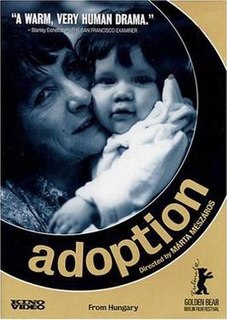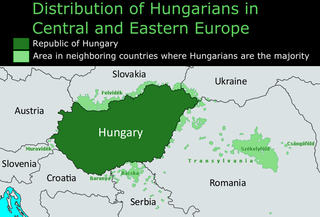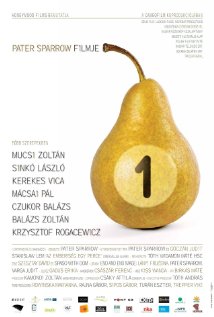The Carmine String Quartet was founded by Varga Veronika, joined by another three Hungarian women. After one personnel change the members are
Judit Varga is a Hungarian middle-distance runner who specialized in the 1500 metres, since 2009 has been naturalized Italian.

Adoption is a 1975 Hungarian drama film directed by Márta Mészáros. It tells the story of Kata, an unmarried female factory worker, who becomes interested in neglected children and tries to adopt one. It was entered into the 25th Berlin International Film Festival, where it won the Golden Bear. The film was also selected as the Hungarian entry for the Best Foreign Language Film at the 48th Academy Awards, but was not accepted as a nominee.

Aszód is a town in Pest county, Hungary.

Hungarian diaspora is a term that encompasses the total ethnic Hungarian population located outside current-day Hungary.

1 is the first feature film of Hungarian director/production designer Pater Sparrow. It was inspired by One Human Minute by Polish science fiction writer Stanisław Lem, a work of pseudepigrapha.

Herzog Blaubarts Burg (1963) is a film of the opera Bluebeard's Castle by the Hungarian composer Béla Bartók, written in 1911 to a symbolist libretto by the poet and later film theorist Béla Balázs. The film was made for West German television, Süddeutscher Rundfunk, and was produced by Norman Foster, who also performs the lead role. The designer was Hein Heckroth who brought in his old friend Michael Powell, for whom he had designed a number of films, to direct it. The film, which was shot at Dürer Film Ateliers in Salzburg, Austria, was out of circulation for decades because of legal problems.

Csillag születik is an unlicensed Hungarian version of Got Talent. It launched on RTL Klub on 20 October 2007. Singers, dancers, comedians, variety acts, and other performers compete against each other for audience support. The winner of the show receives 12 million forint ($50,900/€42,600/£35,300). It is co-hosted by Nóra Ördög and András Stohl. The show has had four seasons so far.
Judit is a feminine given name related to Judith. Notable people with the name include:
My Father's Happy Years is a 1977 Hungarian drama film directed by Sándor Simó. It was entered into the 28th Berlin International Film Festival.

The Koller Gallery is the oldest private gallery in Hungary and is situated in the Castle District of Budapest. On the top floor of the three storey atelier-house the memorial room for the Hungarian artist Amerigo Tot can be found.

Imre Varga was a Hungarian sculptor, painter, designer and graphic artist. He was regarded as one of Hungary's most important living artists, and he has been called one of the "most skilled sculptors in Hungary."
The Buda Health Center is a private health clinic in Budapest. Established in 2000, it offers outpatient health care in two locations in the XIIth District, on Nagy Jenő Street and Királyhágó Street, and in one location in the IIIrd District, at the Graphisoft Park. More than 100 physicians in 45 specialties see their private patients in the facility and more than 230 national and multinational companies have contracted with them for their employees’ health care.
Varga or Vargha is a Hungarian occupational surname derived from the Hungarian term varga, meaning, ”shoemaker” or “cobbler”.

Judit Reigl is a Hungarian painter living in France.

Judit Varga is an Erkel Ferenc Prize and Béla Bartók - Ditta Pásztory Award winner composer, pianist and university lecturer.
The Hungarian pavilion houses Hungary's national representation during the Venice Biennale arts festivals.

József Rácz is a Hungarian physician, psychiatrist, addiction doctor, full professor and the former Head of the Department of Counselling Psychology, Faculty of Education and Psychology at the Eötvös Loránd University and the Head of the Department of Addictology, Faculty of Health Sciences at the Semmelweis University, director at Blue Point Drug Counseling and Outpatient Centre. His books, papers and talks focus on qualitative social psychological research of the drug users.
This page is based on this
Wikipedia article Text is available under the
CC BY-SA 4.0 license; additional terms may apply.
Images, videos and audio are available under their respective licenses.










